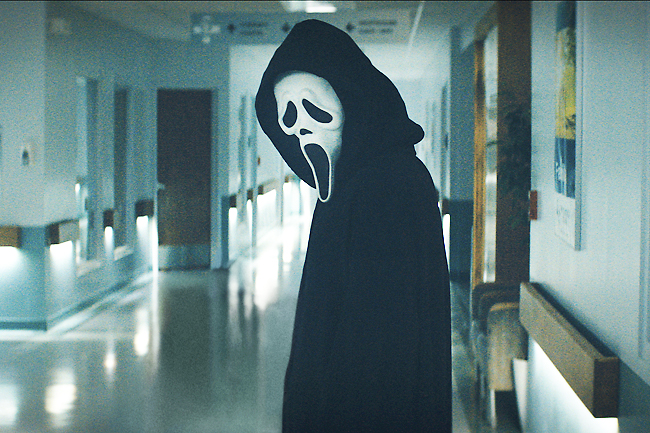Jake Coyle
AP – Ring. Ring.
Twenty-six years after the original, Scream calls again. We’re now up to the fifth film in the franchise, but the first since 2011’s Scream 4. Enough time has passed that this one, titled simply Scream, bears no number, no caller ID. That’s presumably because this Scream, which features the original cast and introduces a new generation of callers and stabbers, is sequel and reboot in one. Or, as one character explicitly defines in Scream, a “requel”.
Part of the charm of the original Scream, a glossy, couldn’t-be-more-’90s slasher, was its knowingness. Wes Craven’s film, written by Kevin Williamson, made a plaything of genre conventions by having the characters openly discuss horror tropes while also being bludgeoned by them. The bright idea of the new Scream is to double down on the meta.
Here, the long-running “Stab” movies – the fictional stand-in for the Scream franchise – is mocked as cheeseball shlock.
In the movie’s opening phone call, one that mirrors the call Drew Barrymore received in the original, Tara (Jenna Ortega) – after initially ignoring a strange call on “the landline” – tells the strange voice on the other end (again Roger Jackson, franchise MVP) that she prefers “elevated horror” like The Babadook, Hereditary and It Follows.
It’s easy to chuckle (and agree) with such winking pronouncements. There’s a lot of such self-referential jokes in the new Scream. But that’s about all there is.
What really is the legacy of Scream? Most, I suspect, hardly recall the three sequels. The original got a big boost from the personalities of its performers, among them Neve Campbell, Courteney Cox, David Arquette and Matthew Lillard. (All but Lillard return here.) But, like Tara suggests, the Scream movies seem like quickly aged relics – particularly when you consider that they were the products of Harvey and Bob Weinstein. If anything, Scream persists mostly because Ghostface, its killer’s trademark Edvard Munch-like mask, remains a Halloween staple.

Filmmakers Matt Bettinelli-Olpin and Tyler Gillett (who helmed 2019’s Ready or Not), working from the script by James Vanderbilt and Guy Busick, don’t offer up much reason for a retread beside some kitschy killer nostalgia, more fun with phones and enough self-mocking irony to almost distract from how thin the movie is.
Working in their favour is a solid young cast, including Ortega, Melissa Barrera (In the Heights) and Jack Quaid (son of Dennis).
Tara’s near-fatal encounter in the film’s first scene draws her estranged sister, Sam (Barrera), to her bedside. Sam arrives with her boyfriend, Richie (Quaid), who professes unfamiliarity with the “Stab” films but proves a quick study at their rules of survival.
We are back in Woodsboro, California, the setting for all the Scream films and site of the murders said to inspire the “Stab” movies. When Ghostface begins slashing again, the kids appeal to an earlier Woodsboro generation (Arquette, Cox, Campbell) for help.
It’s a basic format that’s been trotted out for plenty of reboots before. But aside from its frequent stabs at self-referential comedy, Scream proceeds with a dull repetitiveness. (It’s the first Scream film not directed by Craven, who died in 2015 and to whom the movie is dedicated.)
None of the characters get filled in much, and instead are offered up like mere fodder for Ghostface’s knife.
In the end, Scream becomes a commentary on remakes, reboots and “requels” in a way it doesn’t quite intend. It captures the horror being trapped inside a never-ending loop.






